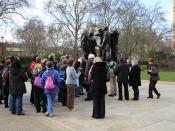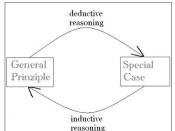Piaget's theory of cognitive development consists of various stages, which happen at various times of a young person's life. The stage of life for an adolescent, between the ages of twelve to sixteen, is known as the formal operational stage. This stage is the fourth and final stage of cognitive development. "Formal operational thinkers can recognize and identify a problem. They can state several alternative hypotheses, execute procedures to collect information about the problems to be studied, and test the hypotheses." (Lin, 2002). Prior to adolescence thought is concentrated on much less complex thoughts.
During this stage they acquire a method of thinking called hypothetical-deductive thought. This is characterized by thinking of various hypothetical possibilities to problems or issues, such as a teenager coming up with different ways to ask their parents to borrow the car on Saturday night. Then follows the application of deductive reasoning to the multitude of possibilities.
This is characterized by a brand of reasoning "from a general statement or principle, through logical steps, to a specific conclusion."(Berger, 366). This train of thought and logical thinking is a major accomplishment for the adolescent, and will come in handy for years to come.
Another characteristic of this developmental stage is the addition of intuitive thought. Intuitive thought has an advantage by being quick, because it is based upon emotions and not reality, but has a tendency to be wrong. (Berger, 369). This is evident as a teenager quickly thinking first that a man walking down the street in raggedy clothes is homeless, not possibly thinking the man has a dirty job.
Another characteristic of this stage is the adolescent's egocentrism. It is in full drive at this point and they tend to think of themselves quite frequently. They also tend to think quite highly of themselves, too.


